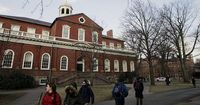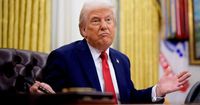Harvard University has found itself at the center of a fierce political battle after rejecting demands from the Trump administration aimed at combating antisemitism on its campus. The university's defiance resulted in the administration freezing $2.2 billion in federal funding, a significant financial blow to one of the most prestigious institutions in the world.
On April 14, 2025, hours after Harvard's president, Alan Garber, publicly stated that the university would not comply with the government’s demands, the Trump administration announced the freezing of $2.2 billion in multi-year grants as well as $60 million in contracts. This action came on the heels of a letter from the Department of Education's newly formed task force, which accused Harvard of fostering a "mentalidade preocupante de direito" or a concerning right-wing mentality endemic in elite universities.
The Trump administration had previously indicated that it was reviewing up to $9 billion in federal contracts and grants to Harvard, as part of a broader initiative to address what it perceives as rising antisemitism on college campuses. This scrutiny intensified following student protests supporting Palestine in the wake of the Hamas attack on Israel on October 7, 2023, and the subsequent Israeli military response in Gaza.
Garber's letter emphasized that no government, regardless of political affiliation, should dictate what private universities can teach or how they operate. "Harvard will not relinquish its independence or constitutional rights," he asserted, reinforcing the institution's commitment to academic freedom and integrity.
In response to Harvard's refusal to meet its demands, the Trump administration's task force claimed that the university's statement highlighted a troubling mindset prevalent in prestigious institutions, suggesting that federal funding does not come with the obligation to uphold civil rights laws. The task force's statement underscored the administration's view that the harassment of Jewish students on campus is intolerable and that elite universities must take the issue seriously if they wish to continue receiving taxpayer support.
In a broader context, the Trump administration's actions are part of a larger trend of targeting universities that do not align with its political agenda. The administration has previously frozen hundreds of millions of dollars in federal funds to various universities, pressuring them to make political and administrative changes under the guise of combating antisemitism.
Last week, a group of Harvard professors filed a lawsuit against the administration, seeking to block its review of nearly $9 billion in federal contracts and grants awarded to the university. This legal challenge reflects the growing tension between academic institutions and government oversight, particularly regarding issues of free speech and academic independence.
Columbia University, another Ivy League institution, has also faced similar pressures. After the Trump administration froze $400 million in federal funding, Columbia agreed to implement several changes, including expanding police powers on campus and appointing a senior vice-rector to oversee its Middle Eastern and South Asian studies programs. This contrasts sharply with Harvard's steadfast refusal to comply with the administration's demands.
Garber criticized the Trump administration's requirements as unprecedented and indicative of an intent to regulate the intellectual environment at Harvard. He noted that while some demands aimed to combat antisemitism, the majority represented direct government regulation of the university's internal affairs.
In January 2025, Harvard had already taken steps to address antisemitism on campus by agreeing to provide additional protections for Jewish students in a settlement to end two lawsuits. However, the recent demands from the Trump administration were seen as overreaching and an infringement on the university's autonomy.
The conflict between Harvard and the Trump administration highlights a significant debate over the balance between public funding and institutional independence. Federal subsidies account for approximately 11% of Harvard's annual budget, which totals $6.4 billion. While some universities have opted to accept reforms to regain federal funding, Harvard's leadership remains resolute in its commitment to academic freedom.
As the situation unfolds, the implications for higher education institutions across the nation are profound. The Trump administration's approach raises critical questions about the future of federal funding in higher education and the extent to which the government can influence academic policies and practices.
In a climate where political tensions are running high, Harvard's stance may serve as a litmus test for other institutions grappling with similar pressures. The university's commitment to protecting its academic integrity, even at the cost of significant financial resources, underscores a growing resistance among elite educational institutions against government overreach.
The ongoing battle between Harvard and the Trump administration reflects broader societal divisions and the contentious nature of free speech and academic freedom in the United States today. As universities navigate these turbulent waters, the outcome of this conflict could shape the landscape of higher education for years to come.









